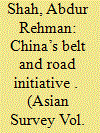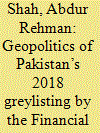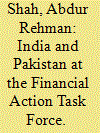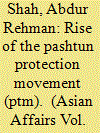| Srl | Item |
| 1 |
ID:
165943


|
|
|
|
|
| Summary/Abstract |
Following Sri Lanka, Pakistan is rapidly accumulating billions of dollars of Chinese debt under the Belt and Road Initiative. This paper argues that that initiative’s disregard for the economic viability of projects and the domestic limitations of countries like Sri Lanka and Pakistan have both external and internal ramifications for the recipient countries.
|
|
|
|
|
|
|
|
|
|
|
|
|
|
|
|
| 2 |
ID:
179858


|
|
|
|
|
| Summary/Abstract |
This article argues that, in addition to the valid reasons for Pakistan’s greylisting by the Financial Action Task Force (FATF) in 2018, geopolitical dynamics also played a crucial role behind this development. While the United States (US) under the Trump administration pushed Pakistan to seek an end to “the longest war” in Afghanistan, India, hoping to curb cross-border terrorism, capitalized on this momentum to pressure Pakistan. In order to hastily greylist Pakistan, institutional procedures of the FATF were thus disregarded. The case study demonstrates how economic coercion was used to push Pakistan to accept US and FATF demands. This article argues that Pakistan’s greylisting has created a win-for-all scenario for now. But these gains should not be overrated. Pakistan’s implementation of FATF requirements faces significant structural limitations. Still, the consensus between major actors underscores the potential of the FATF to counter money laundering and financing of terrorism globally.
|
|
|
|
|
|
|
|
|
|
|
|
|
|
|
|
| 3 |
ID:
184765


|
|
|
|
|
| Summary/Abstract |
Ever since the grey-listing of Pakistan by the Financial Action Task Force (FATF) in early 2018, India and Pakistan have been vying for competing goals. According to Indian perspective, Pakistan is still engaged in cross-border terrorist activities in Indian territories. Therefore, Pakistan must be downgraded to black-list. On the other hand, Pakistan insists it has taken ample measures to comply with FATF demands. According to Islamabad, not only has Pakistan started taking actions against domestic militant units, it has been playing vital role in facilitating ‘peace talks’ to end the Afghan war. In contrast, this article argues both of these narratives verge on extremes in their own respects. India’s recent claims about cross-border terrorism are profoundly diluted by domestic resistance it has been facing in Indian-administered Kashmir of late. Moreover, a black-listed Pakistan could pose an even bigger challenge. Similarly, this article argues that getting Pakistan off the grey list would be too early at the present time. The country still needs to implement half of its ‘action plan’ as identified by the FATF. A more realistic option, therefore, would be to take the middle ground and proceed with current FATF supervision of Pakistan’s performance for a further period.
|
|
|
|
|
|
|
|
|
|
|
|
|
|
|
|
| 4 |
ID:
172566


|
|
|
|
|
| Summary/Abstract |
In early 2018, the Pashtun Tahafuz Movement or Pashtun Protection Movement (PTM) came suddenly into the limelight in Pakistan. The PTM is spearheaded by young firebrand Pashtun generation mainly from the war-torn North-West Frontier region of the country. However, the movement's rhetoric and policy agenda have put it at loggerheads with Pakistan's powerful military establishment. Whilst the PTM blames the Army for the plight of Pashtuns in the country, the military has labelled the movement as a foreign ‘proxy’ working at the behest of other countries against the institutions of its own state. In essence, both parties have resorted to conspiracy theories of one sort or the other. This development has strained the nascent process of ‘mainstreaming’ the Federally Administered Tribal Areas (FATA) into becoming a normalized part of Pakistan. However, there are some encouraging political aspects and developments related to this debate. These include the increasingly wide-scale use of social media for political activism and awareness; various impacts on merger of FATA with Khyber Pakhtunkhwa; and also the successful conduct of recent provincial elections in the region.
|
|
|
|
|
|
|
|
|
|
|
|
|
|
|
|